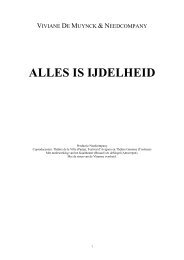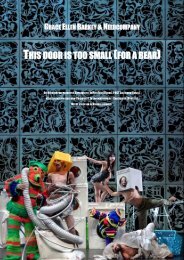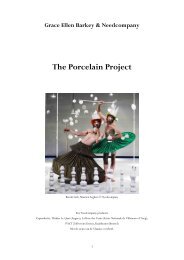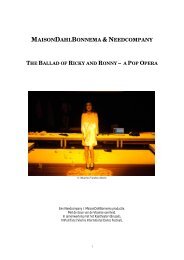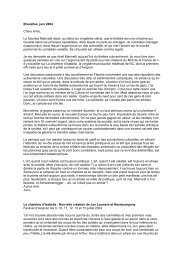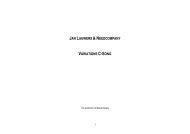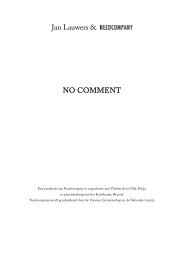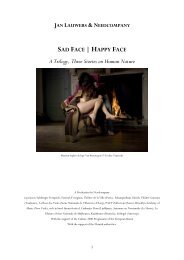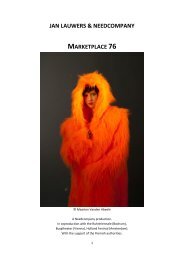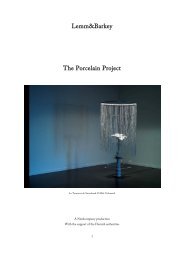THE ART OF ENTERTAINMENT - Needcompany
THE ART OF ENTERTAINMENT - Needcompany
THE ART OF ENTERTAINMENT - Needcompany
Create successful ePaper yourself
Turn your PDF publications into a flip-book with our unique Google optimized e-Paper software.
FRAGMENTS FROM AN INTERVIEW WITH JAN LAUWERS AND JÉRÔME SANS<br />
You are a theatre-maker, film-maker, writer and visual artist. How do you describe yourself?<br />
Not as a director, painter, writer or film-maker. I am just an artist who tries to use all those different media.<br />
Isn’t that the only way to survive? Why should I restrict myself? Art should not specialise. Art begins when<br />
thinking is still in its infancy. Leave specialisation to the scientists and the philosophers! In art I prefer to use<br />
other words, like ‘hysteria’. Philosophers have a lot to learn from non-specialised artists. Together we can<br />
achieve general wisdom. That is the eventual goal: achieving wisdom. We invariably fail to do that and we<br />
call that failure beauty.<br />
I use as many different means of expression as I possibly can. At first I found that frustrating; now I see it as<br />
a blessing. I am no longer afraid of it. The restlessness it causes serves as a driving force. Every medium<br />
raises different questions. In visual art you have to destroy your virtuosity, while in the theatre world you<br />
have to foster it. It took me twenty years to understand the ‘theatre’ medium, which is a mix of contact<br />
with the public, the vulnerability of the actors, the virtuosity and the vanity of the medium… and the<br />
applause, the tragedy of theatre.<br />
When I started out in theatre, I was not interested in classical theatre and I didn’t know the repertoire. My<br />
introduction to the theatre was a performance by the German artist Joseph Beuys in which he wiped fat off<br />
a wall. I was interested in the dark depression of his performances and his drawings. That was in 1976, a<br />
crucial year in my life as a young artist. I saw the exhibition of Joseph Beuys’s drawings at Jan Hoet’s<br />
Museum of Contemporary Art in Ghent; it was the year of Bob Wilson’s and Philip Glass’s Einstein on the<br />
Beach and, of course, of the Sex Pistols’ first record. I was in my first year at the art academy and I<br />
discovered Joseph Kosuth and the conceptual writings of Art&Language, and everyone was reading<br />
Wittgenstein. I was a very restless young man and I was determined to leave my mark.<br />
When I see how the art of the last twenty years has evolved, or rather, has adapted to the aspirations of<br />
the public, to the desire for the spectacular, glamorous side of our culture and how it manifests itself as a<br />
fashion phenomenon, then I really despair. Art is too temporary, too susceptible to market mechanisms.<br />
Nobody escapes them any longer. We live in a cowardly and deceitful age. That’s why people seek refuge in<br />
a superficial realism. Big Brother is described as avant-garde and war photography is elevated to the rank of<br />
art. People want recognisable forms. The fact that I only take Polaroid photos of objects I have made myself<br />
makes the Polaroids important. They go against that realism.<br />
You are known for your actors’ acting and in particular for the paradox between ‘acting’ and ‘not acting’.<br />
How do you work with the different protagonists you bring together in your performances?<br />
If you want to find the autonomy of a medium, you simply have to keep looking. As a director I don’t look<br />
for form, but for a code. As soon as that code becomes clear, I want my actors to contest my authority. And<br />
if they haven’t understood the code, we’ve failed. That is not to say that I dictate my actors’ every gesture<br />
according to my script. That is sometimes a problem for those who are trained for reproduction. We have<br />
to destroy the idea of representation in the theatre and replace it with presentation. That is the only link<br />
with performance… It is the action that counts, not necessarily the result.<br />
Your type of theatre seems to be more a work in progress than an objective per se.<br />
That’s the difference between presentation and representation. With a presentation the moment itself, the<br />
‘thinking moment’, is the most important for the performers. That way the work is always moving forward<br />
14



